written by David Steffen
The Hugo Awards Best Novella category covers stories between 17,500 and 40,000 words. See here for a full list of the nominees this year. I enjoyed all of the novellas this year, I’m glad that the Hugos use instant-runoff voting so I can give some kind of vote for them all instead of just having to pick one!
1. “And Then There Were (N-One),” by Sarah Pinsker (Uncanny, March/April 2017)
A Sarah Pinsker from an alternate reality has discovered how to travel to alternate realities. One of the first actions this alternate Sarah Pinsker performs is to organize the first SarahCon, attended entirely by Sarah Pinskers of various realities. This Sarah (an insurance adjuster) grudgingly decides to attend, where she meets hundreds of herselves and is just starting to figure out how to navigate the odd social situation of talking to all these other Sarahs, when a dead body is discovered, apparently a murder, and this Sarah Pinsker is the closest Sarah available to one with detective experience while they wait for the authorities to arrive on the island of the convention. The victim is Sarah Pinsker. Pretty much all of the suspects and potential witnesses are Sarah Pinsker. And Sarah Pinsker is on the case.
This story was wonderful and fun and delightful and hilarious. There was plenty of humor inherent in the situation, but the murder mystery is played straight–it has all of the components you expect from a murder mystery, except that the scenario adds a bizarre twist to the situation that both complicates (because it’s hard to even tell the people apart) and simplifies (because Sarah has a better understanding of the suspects than she would if they were entirely separate people) the investigation. This lends itself to the story taking some turns that would only make sense in this very specific situation. Highly recommended, I have been recommending this to anyone who has asked me what I’m reading.
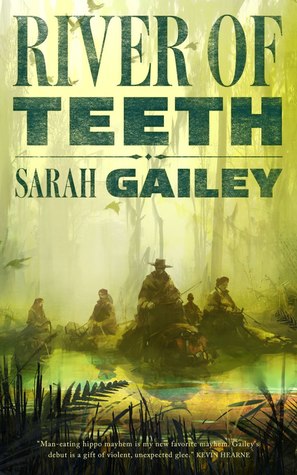 2. River of Teeth, by Sarah Gailey (Tor.com Publishing)
2. River of Teeth, by Sarah Gailey (Tor.com Publishing)
This was previously reviewed at greater length here last year.
Usually alternate history is used to explore the consequences of major political or military events turning out differently. But sometimes, it can just be used as a reason to tell a Western story about hippo-riding cowboys in Louisiana (alt history because there was an early 20th century proposal to import hippos to raise them for meat).
Winslow Houndstooth had been happy as a hippo rancher until his ranch was burned to the ground. Now Houndstooth is a hired hand, and he’s accepted a job from the government to clear all of the feral hippos out of the Mississippi, and he also has revenge on his mind to get back at the one who destroyed his ranch.
This is so much fun, very much a western style story but with the significant added wrinkle that their mounts/cattle can bite them in half. The story is told straight, so the hippos aren’t used for comedy, but that just makes it all the more fun. It has the feel of a heist sort of story, with Winslow as the leader gathering skilled specialists to perform the seemingly impossible mission.
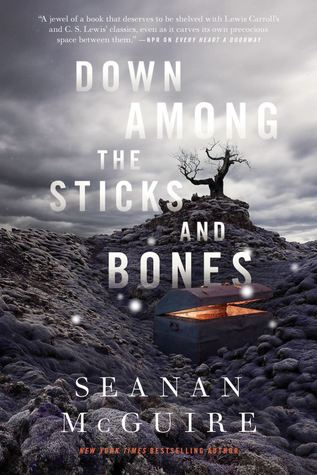 3. Down Among the Sticks and Bones, by Seanan McGuire (Tor.com Publishing)
3. Down Among the Sticks and Bones, by Seanan McGuire (Tor.com Publishing)
Jacqueline and Jillian are twin sisters, weighed under the heavy burden of parental expectations. Every aspect of what they do and how they present to the world is defined by their parents who wanted the perfect boy and the perfect girl. Jacqueline is the perfect princess of a girl, never dirty, never impolite, while Jillian is a tomboy who excels at athletics and never does things that might be considered girlish. When they’re thirteen the girls discover a portal into another world in their house and they travel through it, to a land protected and contained by a vampire and a mad doctor who can raise corpses from the dead. Portal visitors are a common occurrence here, and due to a prior arrangement, the girls each go into the custody of one of these powerful men and must make their way in this strange world until they can find a doorway home.
This ties into McGuire’s Wayward Children series, but you don’t need any familiarity with the series to read this–it works just fine as a standalone. It is built largely on the audience expectations of portal stories, so if (like me) those are a particular favorite, you’ll be well-primed for this. The characters are both well-portayed as real people as well as larger than life in some ways because they are constantly being pushed into boundaries that generally do not fit them. It’s a story of what makes each of us different from the others, and how our environments and constraints on our behavior end up defining much of who we are. It’s also a tale of sisterhood coming from a family that didn’t exactly nurture their relationship, thrown into adversity of a strange world. Well worth the read.
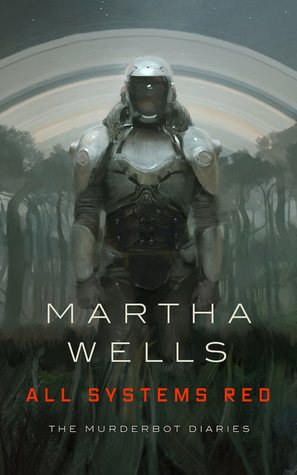 4. All Systems Red, by Martha Wells (Tor.com Publishing)
4. All Systems Red, by Martha Wells (Tor.com Publishing)
The security android (SecBot for short) calls itself Murderbot, but only in the privacy of its own head. It’s part robot part human, property of the Company, on security detail with a group of humans surveying a planet for resources. Unbeknownst to its crew, it has successfully hacked its governor module that is supposed to keep it safe and limit its behavior to only those things necessary for its security duties. But, really, it uses most of that freedom to download and watch entertainment vids in every moment of spare time. Its current crew is disconcertingly friendly, which is bothersome when it really just wants to be left alone to watch its shows. When a series of things go wrong with the surveying mission, it’s not clear if its due to the Company’s cut-rate equipment or if someone is sabotaging them. But Murderbot’s vid-watching has (surprisingly) prepared it for unexpected situations more than its actual functional programming, and if it wants to survive it’s going to have to help its crew get out of this.
Murderbot is a fun and charming character in its own way. While some parts of its personality are far from mine (a casual attitude toward violence, but that’s inherent in its programming) I think its character is particularly appealing for introverts who may find friendliness from others alarming at times. Murderbot is a very competent character and it’s a solid action story, but the biggest charm of it for me was just enjoying the kind of odd personality traits, different from most human characters in stories but also different from most robot characters in stories. Fun, and the first of a series.
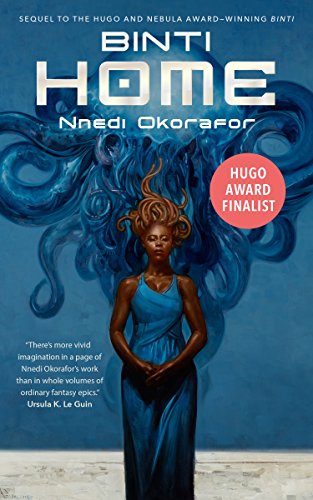 5. Binti: Home, by Nnedi Okorafor (Tor.com Publishing)
5. Binti: Home, by Nnedi Okorafor (Tor.com Publishing)
The original Binti was reviewed here as part of the Hugo Novella Review in 2016. Binti: Home is the second story in the series.
Binti is the first human from the Himba culture to travel to the stars where she is attending Oomza University, where she is learning to refine her skill for mentally manipulating magical formulas. The first story told of the tragic happenings of her trip where she was the sole survivor of an attack by the jellyfish-like Meduse and went on to help forge a peace between humans and Meduse, and in the process was physically changed so that her braids became like a Meduse’s tentacles, able to move of their own volition. Now she is returning home to Earth to her family to go on a pilgrimage during her break in her schooling, and she’s bringing her Meduse friend Okwu with her. With the truce with the Meduse still fresh and tentative, and with Binti changed dramatically by her new experiences since leaving home, she doesn’t know how her family and culture will receive her.
Solid story, and I like following Binti as much as the first time. The first book took place mostly off-Earth so you didn’t get to see much of Binti’s home or her culture directly. This story takes place almost entirely here, we get to know her family and her background better. This story is the second in what I think will be a trilogy and it does feel like that–it is clearly building FROM something, and clearly building TO something where it will go next, but as itself I wanted to get the rest of the story–I will be excited to read the third story. I would recommend not starting the series with this book–I don’t think you’ll get everything out of it if you haven’t seen Binti’s path so far, and the previous conflict with the Meduse and the beginning of the truce.
 6. The Black Tides of Heaven, by JY Yang (Tor.com Publishing)
6. The Black Tides of Heaven, by JY Yang (Tor.com Publishing)
Mokoya and Akeha are the twin children of the Protector, sold to the Monastery at birth. Mokoya is plagued by visions of the future that can’t be changed, and Akeha is drawn to political revolution. The Machinist rebellion is growing, the power of technology growing quickly and threatening the iron rule of the Protectorate and their soldiers, and both of the siblings see the terrible things their mother does to maintain her rule. They must make decisions about where their loyalties lie and where their abilities are best used.
This story ties into the author’s Tensorate series, and was dual-released with another novella in the same universe The Red Threads of Fortune, but it works as a standalone–you don’t need any prior knowledge of the characters or universe to be able to follow the story. I haven’t read the related novella or the other books in the series, but I enjoyed getting to know the twins and their relationship with each other. What I found particularly interesting was some of the cultural details, especially how children are not considered a specific gender until they’re old enough to decide their gender for themselves, and how Tensorate magic is used to facilitate this process–although parts of living under Protectorate rule seem oppressive, this particular aspect was positive and interesting.

 1.
1.  2.
2. 
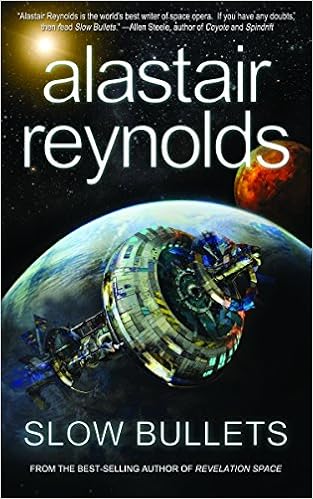 4.
4.  5. The Builders by Daniel Polansky (Tor.com)
5. The Builders by Daniel Polansky (Tor.com)